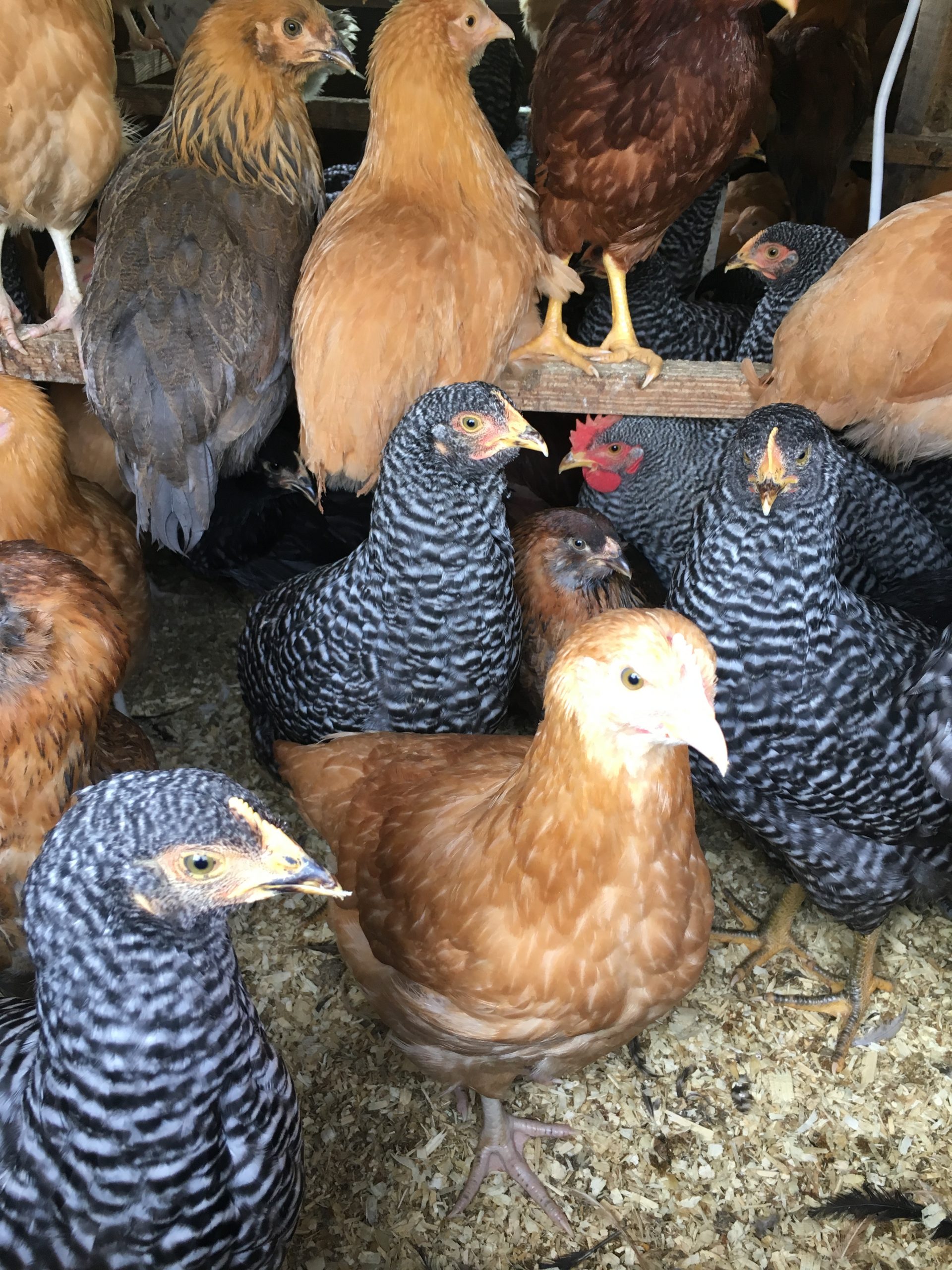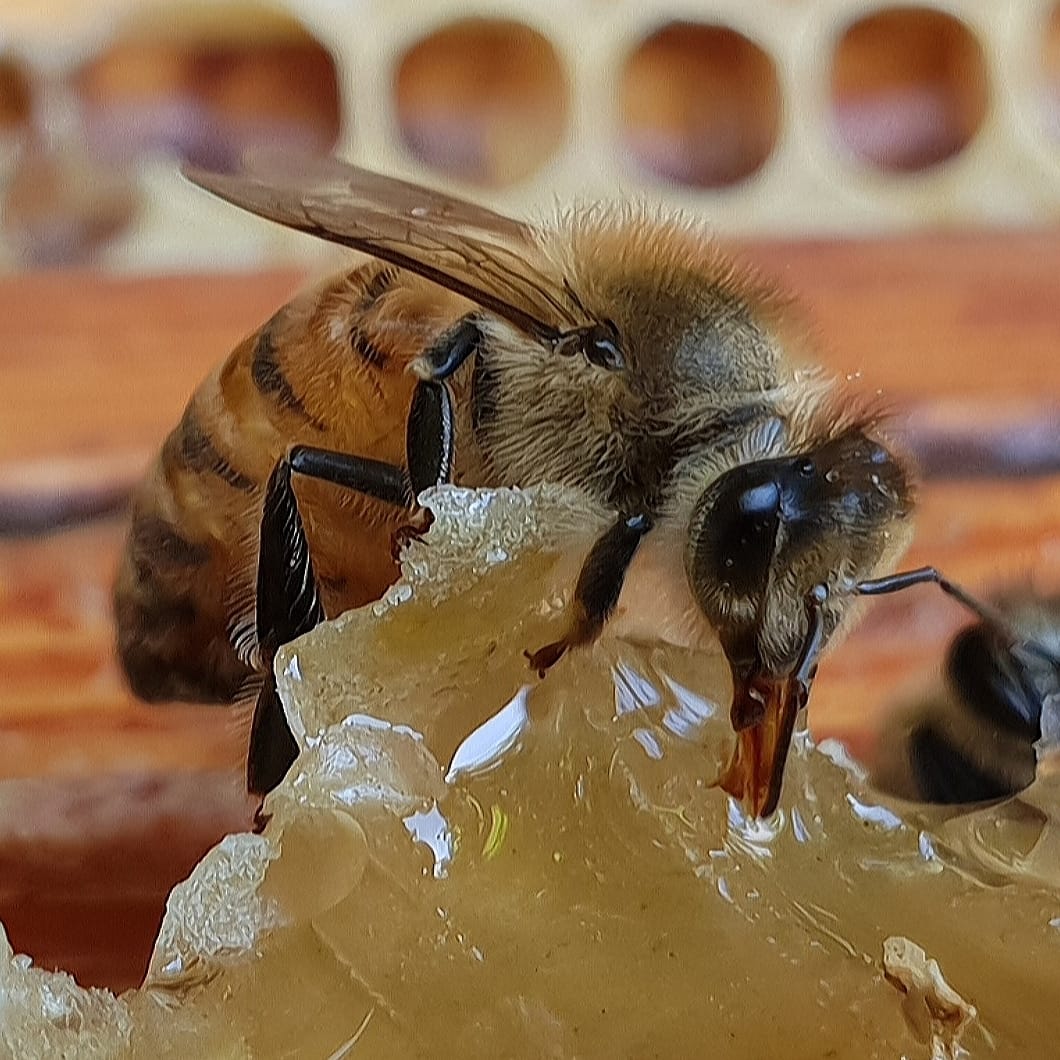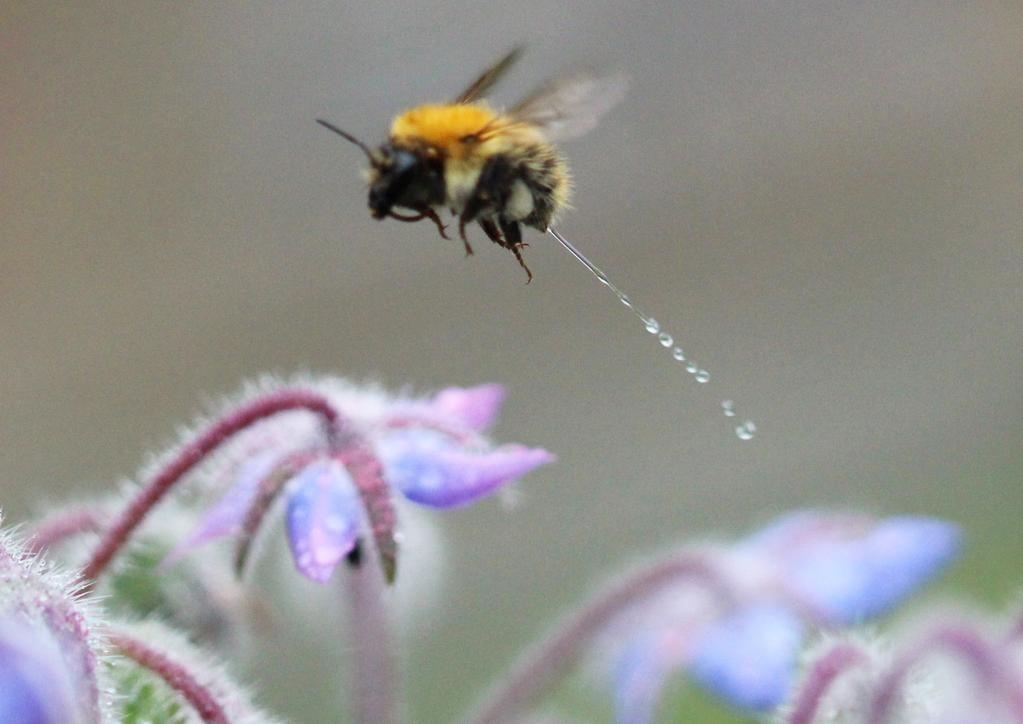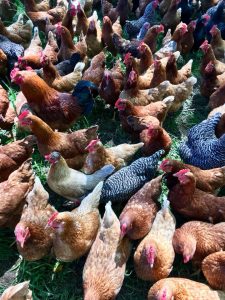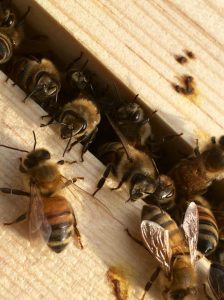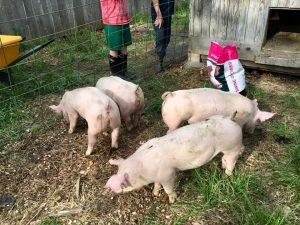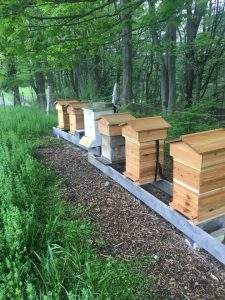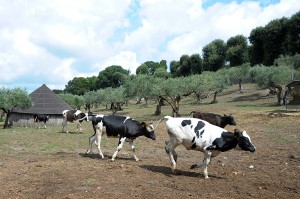The other day I was poking around on the calendar as we were very quickly moving to the end of one civil year and the beginning of another finding that the first day of Spring is 20 March 2021. I have Spring on the brain and with Spring also the gardens and my venerable honey bees. Also in my search I found that the Roman Pontiff, Pope Pius XII, in 1948 issued an address “On Bees.” The papal text was translated by Augustine Klaas, S.J., and he also wrote an introduction.
What has been on my mind for some time is the sacramentality of creation. Some will question this idea but they are the ones with little education which coincides with a lack of integration between the spiritual and natural in Christianity that comes about in the Incarnation. From time immemorial there Mother Church, both East and West, have considered creation as a sacrament. Some Catholic and Orthodox thinkers in recent years have contributed to a body of knowledge that is appreciative of the fact that there is a sacrament connection (integration) of the spiritual and natural.
I have longed said that if you want to be a virtuous person, a person of faith, hope and charity, work with agriculture. You would have to encounter your own virtue or lack of virtue in time (or perhaps pretty quickly). In particular, keep honey bees will be illuminating to faith and reason and human behavior. I came to this conclusion prior to reading the Pope Pius XII but having read the texts for blessing honey bees, hives and new honey from both the Eastern and Western Churches. The Blessing of Bees and honey are posted here on Communio as I am committed to the annual blessing of bees and honey and the rest of our agriculture pursuits.
Here are the two texts.
Introduction
BEES are fascinating little creatures of God. They have always intrigued mankind by their subtle, winning ways, though on occasion some of their ways are less than winning and one is not subtle at all. The observation and study of their structure, habits, spirit of work, organization, and marvelous co-operation, ever interested man even more than their valuable products of honey and wax. Then, too, lessons of wisdom abound in bees.
Who has not delighted in the exact descriptions of the old classic authors? Homer sings of bees which “issuing ever fresh from a hollow rock, fly in clusters on the vernal flowers” (, II, 87). Virgil vividly notes their activity in the early summer fields and meadows, and in the hive, where “the work goes busily forward, and the fragrant honey is redolent of thyme” (, IV, 169). Shakespeare, too, tells of “singing masons building roofs of gold” and of dire punishment meted out by “sad-eyed justice” to the “lazy, yawning drone”.
Holy Scripture, especially the Old Testament, speaks quite often of bees. Dense armies of soldiers are compared to bees (Is. 7:18) chasing man (Deut. 1:44) and surrounding him (Ps. 117:12). “The bee,” says Ecclesiasticus (11:3), “is small among flying things, but her fruit hath the chiefest sweetness.” And an addition to the Septuagint version of Proverbs (6th chapter) commends the bee after the ant: “Go to the ant, O sluggard, and consider her ways, and learn wisdom …. Or go to the bee, and learn how industrious she is, and bow her industry deserves our respect, for kings and the sick make use of the product of her labor for their health. Indeed, she is glorious and desired by all, and though she be frail, she is honored, because she treasures wisdom.”
Honey is often mentioned in Holy Scripture; for instance, Canaan was a land that “floweth with milk and honey” (Ex. 3:8). Honey was a rather essential ingredient of Saint John the Baptist’s diet (Matt. 3:4). I do not know that Holy Scripture anywhere mentions beeswax.
Deborah, the Hebrew word for bee, is an Old Testament feminine name. Rebecca’s nurse bore that name (Gen. 35:8).
The Fathers of the Church draw many lessons from bees. Following in their footsteps, spiritual writers like Saint Francis de Sales and Saint Teresa of Avila see holy wisdom in these tiny humming insects. For example, Saint Teresa says that in the prayer of quiet the will should not chase after the understanding. which now is “merely making itself a nuisance,” but rather enjoy its tranquil union with God and “be as recollected as the wise little bee. For if no bees entered the hive and they all went about trying to bring each other in, there would not be much chance of their making any honey” (, Chapter 15). Elsewhere she asserts that we should sometimes leave off soul-searching, remembering “that the bee is constantly flying about from flower to flower, and in the same way, believe me, the soul must sometimes emerge from self- knowledge and soar aloft in meditation upon the greatness and the majesty of its God” (, I, 2). Again, referring to the humility which must be in souls favored with visions, she avers that “if what should engender humility in the soul, which knows it does not deserve such a favor, makes it proud, it becomes like a spider, which turns all its food into poison, instead of resembling the bee, which turns it into honey” (, Chapter 8).
Of course, the patron of bees is Saint Ambrose, and the reason for it will be found in the breviary in the second nocturne of his feast. Saint Dominic is also spoken of as another patron of the bees, but no one seems to know just why.
The bee comes into the liturgy also: for example, the famous appears in a versicle of Matins for Saint Cecilia’s day: “Busy like a bee, thou didst serve the Lord.” And everyone recalls the “mother bee” of Holy Saturday morning [reference to the line in Exultet].
Granted this age-old tradition, sacred and secular, of seeking wisdom in bees, it is not surprising to find Pius XII discoursing on bees charmingly and instructively. The apiarists of Italy held a national convention in Rome last November, and on the 27th they went in a body to pay their respects to the Pope. In public audience they presented him with gifts, honey and beeswax, the latter probably in the form of candles. The Holy Father graciously replied.
ADDRESS OF PIUS XII
November 27, 1948
Your presence in such large numbers, your desire to assemble before Us, beloved sons, is a real comfort: and so We express our heartfelt gratitude for your homage and your gifts, both particularly pleasing to Us. Beyond its material and technical importance, the work which you represent, by its nature and significance has a psychological, moral, social, and even religious interest of no small value. Have not bees been sung almost universally in the poetry, sacred no less than profane, of all times?
Impelled and guided by instinct, a visible trace and testimony of the unseen wisdom of the Creator, what lessons do not bees give to men, who are, or should be, guided by reason, the living reflection of the divine intellect!
Bees are models of social life and activity, in which each class has its duty to perform and performs it exactly—one is almost tempted to say conscientiously—without envy, without rivalry, in the order and position assigned to each, with care and love. Even the most inexperienced observer of bee culture admires the delicacy and perfection of this work. Unlike the butterfly which flits from flower to flower out of pure caprice; unlike the wasp and the hornet, brutal aggressors, who seem intent on doing only harm with no benefit for anyone, the bee pierces to the very depths of the flower’s calix diligently, adroitly, and so delicately, that once its precious treasure has been gathered, it gently leaves the flowers without having injured in the least the light texture of their garments or caused a single one of their petals the loss of its immaculate freshness.
Then, loaded down with sweet-scented nectar, pollen, and propolis, without capricious gyrations, without lazy delays, swift as an arrow, with precise, unerring, certain flight, it returns to the hive, where valorous work goes on intensely to process the riches so carefully garnered, to produce the wax and the honey. (Virgil, 4, 169.)
Ah, if men could and would listen to the lesson of the bees: if each one knew how to do his daily duty with order and love at the post assigned to him by Providence; if everyone knew how to enjoy, love, and use in the intimate harmony of the domestic hearth the little treasures accumulated away from home during his working day: if men, with delicacy, and to speak humanly, with elegance, and also, to speak as a Christian, with charity in their dealings with their fellow men, would only profit from the truth and the beauty conceived in their minds, from the nobility and goodness carried about in the intimate depths of their hearts, without offending by indiscretion and stupidity, without soiling the purity of their thought and their love, if they only knew how to assimilate without jealousy and pride the riches acquired by contact with their brothers and to develop them in their turn by reflection and the work of their own minds and hearts; if, in a word, they learned to do by intelligence and wisdom what bees do by instinct—how much better the world would be!
Working like bees with order and peace, men would learn to enjoy and have others enjoy the fruit of their labors, the honey and the was, the sweetness and the light in this life here below.
Instead, how often, alas, they spoil the better and more beautiful things by their harshness, violence, and malice: how often they seek and find in every thing only imperfection and evil, and misinterpreting even the most honest intentions, turn goodness into bitterness!
Let them learn therefore to enter with respect, trust, and charity into the minds and hearts of their fellow men discreetly but deeply; then they like the bees will know how to discover in the humblest souls the perfume of nobility and of eminent virtue, sometimes unknown even to those who possess it. They will learn to discern in the depths of the most obtuse intelligence, of the most uneducated persons, in the depths even of the minds of their enemies, at least some trace of healthy judgment, some glimmer of truth and goodness.
As for you, beloved sons, who while bending over your beehives perform with all care the most varied and delicate work for your bees, let your spirits rise in mystic flight to experience the kindness of God, to taste the sweetness of His word and His law (Ps. 18:11; 118: 103), to contemplate the divine light symbolized by the burning flame of the candle, product of the mother bee, as the Church sings in her admirable liturgy of Holy Saturday: (For it is nourished by the melting wax, which the mother bee produced for the substance of this precious light.)
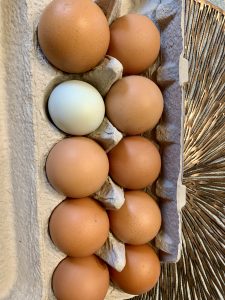 The chickens, for example are on pasture 12 months a year; each hen makes a decision to come-and-go as she pleases. She is an omnivore. No doubt that many people don’t know that chickens eat meat: bugs, worms, other meat pieces. Chickens are not by nature vegan or vegetarian. In the summer I feed them plentiful amounts of lettuce, tomatoes, and squashes.
The chickens, for example are on pasture 12 months a year; each hen makes a decision to come-and-go as she pleases. She is an omnivore. No doubt that many people don’t know that chickens eat meat: bugs, worms, other meat pieces. Chickens are not by nature vegan or vegetarian. In the summer I feed them plentiful amounts of lettuce, tomatoes, and squashes.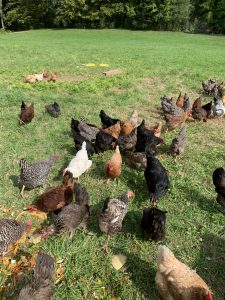 Nothing is better that nutrient dense eggs with a rich orange yolk encased in a strong shell. Pastured eggs makes extraordinary crème brûlée and zabaione, they change the rise in cakes, they fill you up, and they nourish the body. There is little concern in pastured eggs for the ugly cholesterol most fear giving us higher amounts of omega-3 fats, including, as science reveals, lutein and zeaxanthin, with excellent amounts of vitamin D, four times more vitamin E, antioxidants that we need to protect the eyes and reducing eye diseases. In short, our eggs contain high-quality protein and healthy fats.
Nothing is better that nutrient dense eggs with a rich orange yolk encased in a strong shell. Pastured eggs makes extraordinary crème brûlée and zabaione, they change the rise in cakes, they fill you up, and they nourish the body. There is little concern in pastured eggs for the ugly cholesterol most fear giving us higher amounts of omega-3 fats, including, as science reveals, lutein and zeaxanthin, with excellent amounts of vitamin D, four times more vitamin E, antioxidants that we need to protect the eyes and reducing eye diseases. In short, our eggs contain high-quality protein and healthy fats.